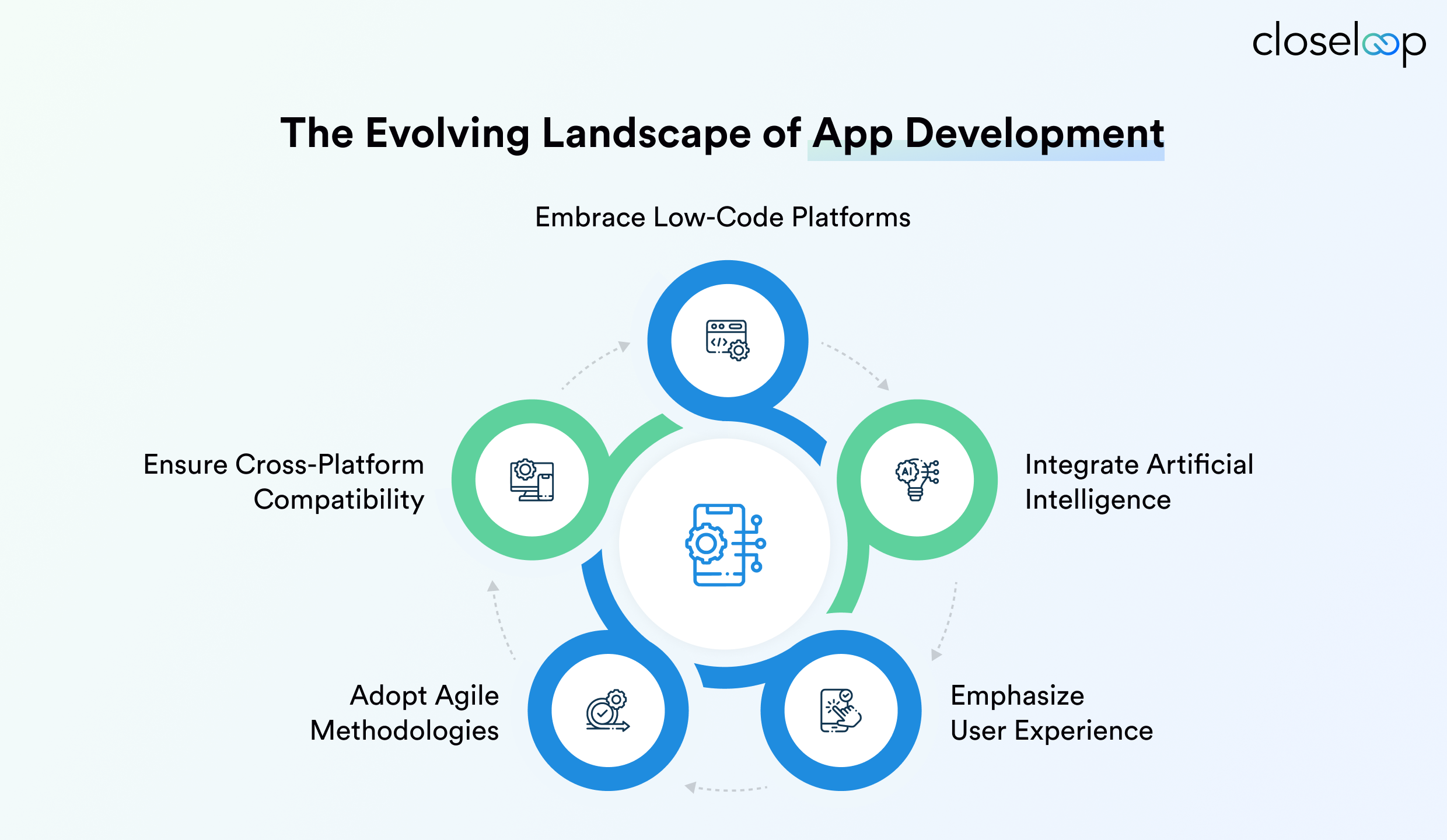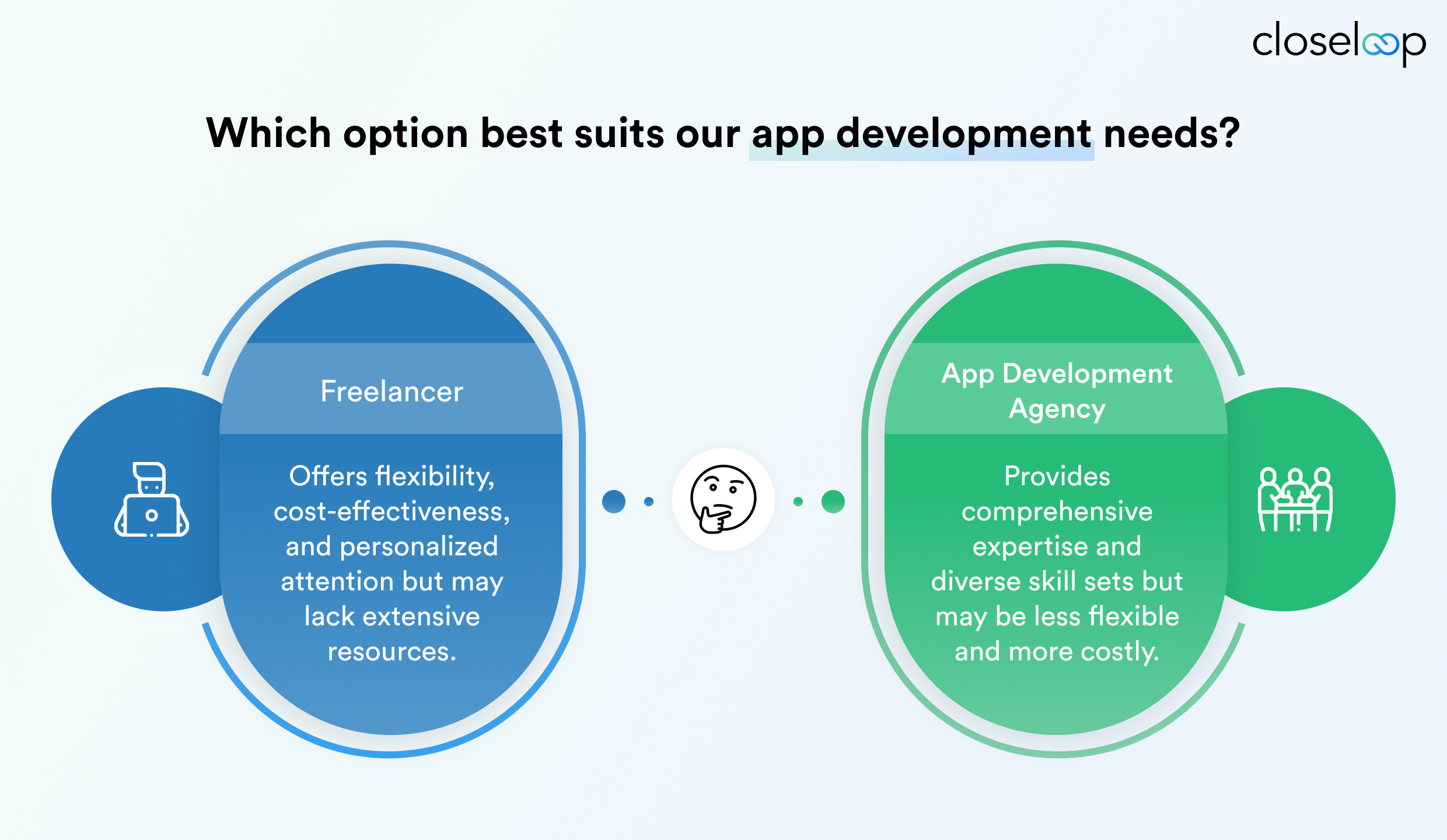Your app idea is brilliant. Your budget is limited. Your timeline is tight. Now comes the million-dollar question: Do you hire a freelancer or partner with an agency?
Imagine if you're the founder of a promising fintech startup. Your MVP needs to be live in six months, regulatory compliance is non-negotiable, and your Series A funding depends on user traction. One misstep in choosing your development partner could mean the difference between unicorn status and becoming another cautionary tale.
This isn't just about saving money or moving fast—it's about strategic decision-making that impacts your product's entire lifecycle. With the mobile app market projected to reach $626.39 billion by 2030, the stakes have never been higher. Every dollar you invest in development needs to deliver measurable returns, not just pretty interfaces.
The freelancing economy is booming too, with platforms expected to hit $14.39 billion by 2030. Meanwhile, application development agencies are evolving beyond traditional service providers to become strategic partners. But here's the catch: choosing the wrong path can cost you more than money—it can cost you market opportunity.
We've analyzed hundreds of development projects, interviewed startup founders, and dissected agency portfolios to bring you the definitive guide to maximizing your app development ROI in 2025. No generic advice, no one-size-fits-all solutions—just practical insights that help you make the right choice for your specific situation.
Key Takeaways
Freelancers Offer Cost-Efficiency & Specialization: Ideal for projects with clear, narrow scopes and specific tech needs, often at 40-60% lower hourly rates.
Agencies Provide Comprehensive Solutions & Risk Mitigation: Best for complex projects requiring diverse skill sets (design, development, QA, DevOps), offering built-in redundancy and established processes.
2025 Demands ROI: App development isn't just about cost; it's about measurable business outcomes, forcing both freelancers and agencies to evolve their value.
Hidden Costs Exist: Freelancers carry risks like single points of failure and variable quality, while agencies have overhead and potential communication layers.
Strategic Choice is Key: Match your project's complexity, timeline, risk tolerance, and industry-specific needs (e.g., HIPAA for healthcare) with the right partner.
Closeloop's Hybrid Model: We offer a blend of freelancer specialization and agency reliability, providing end-to-end service with transparent pricing for maximized ROI.
The New Reality of App Development in 2025
The app development landscape has fundamentally shifted. Gone are the days when you could throw together a basic app and expect users to flock to it. Today's users demand seamless experiences, enterprise-grade security, and AI-powered personalization—all while expecting lightning-fast load times and flawless performance across devices.

The Complexity Explosion
Modern apps aren't just mobile websites with push notifications. They're sophisticated software platforms that integrate with multiple APIs, handle real-time data processing, and often incorporate emerging technologies like machine learning and augmented reality. A simple e-commerce app today requires payment processing, inventory management, customer service chat, analytics tracking, and seamless integration with social media platforms.
This complexity surge has created a skills gap that affects both freelancers and agencies differently. While top-tier freelancers might excel in specific technologies, agencies have adapted by building comprehensive teams that can handle full-stack development, DevOps, and ongoing maintenance under one roof.
The ROI Imperative
With venture capital becoming more selective and economic uncertainty looming, every development dollar needs to be justified. Companies are no longer asking "How much will this cost?" but rather "What will this deliver?" This shift has forced both freelancers and agencies to evolve their value propositions beyond simple hourly rates.
The most successful apps of 2025 aren't just well-coded—they're strategically designed to drive specific business outcomes. Whether that's reducing customer acquisition costs, increasing user lifetime value, or automating internal processes, the app development partner you choose must understand your business goals as deeply as they understand your technical requirements.
Comparison of Freelancers vs App Development Agencies: Taking A Glance
Here's a quick comparison to help you understand the key differences between working with freelancers versus agencies.
Comparison Factor | Freelancers | App Development Agencies |
Cost Range | $10-$75/hour (varies by region) | $50-$250/hour (varies by expertise) |
Project Timeline | 3-8 months (depends on complexity) | 2-6 months (faster delivery) |
Team Size | 1-3 individuals | 5-20+ professionals |
Expertise Breadth | Specialized in 1-2 areas | Full-stack capabilities |
Communication | Direct, but limited availability | Structured, dedicated project managers |
Quality Assurance | Individual responsibility | Systematic QA processes |
Post-Launch Support | Limited or additional cost | Comprehensive maintenance packages |
Risk Level | Higher (dependency on individual) | Lower (team redundancy) |
Scalability | Limited to individual capacity | Highly scalable resources |
Documentation | Variable quality | Professional documentation |
Payment Terms | Hourly or project-based | Milestone-based with contracts |
Market Access | Limited marketing support | Strategic marketing insights |
Understanding the Fundamental Differences
Before diving into pros and cons, it's crucial to understand what you're actually comparing. The gap between freelancers and agencies extends far beyond team size and pricing models—it's a fundamental difference in approach, accountability, and long-term partnership potential to develop a feature-rich mobile app.
The Freelancer Ecosystem
Today's freelance developers aren't just solo coders working from coffee shops. Many are seasoned professionals who've left corporate environments to build specialized practices. They often focus on specific technologies, industries, or project types, developing deep expertise that can be invaluable for targeted needs.
The best freelancers have evolved into consultants who bring strategic thinking alongside technical skills. They understand market trends, user behavior, and business models within their niches. However, their success is inherently tied to their individual capacity and expertise.
The Agency Evolution
Modern development agencies have transformed from traditional service providers into strategic partners. They've invested heavily in processes, tools, and team structures that enable them to deliver consistent results across multiple projects simultaneously. The best agencies function as extensions of their clients' teams, bringing industry knowledge and technical expertise that individual freelancers might lack.
However, this evolution has also created complexity. Not all agencies are created equal, and the difference between a boutique agency and a large consultancy can be as significant as the difference between a freelancer and an agency.
The Freelancer Advantage: When Individual Expertise Wins
Freelancers aren't just a budget option—they're often the smartest choice for specific scenarios. Understanding when and why to choose freelance talent can save you significant money while delivering superior results.
Cost Efficiency with Strategic Value
The 40-60% cost savings of freelancers compared to agencies isn't just about lower hourly rates—it's about paying for exactly what you need. When you hire a React Native specialist for a cross-platform app development, you're getting someone who lives and breathes that technology. They're not learning on your dime or applying generic solutions to your specific challenges.
This efficiency extends to project timelines. Freelancers can often move faster on straightforward projects because they don't need to coordinate with multiple team members or navigate corporate approval processes. For startups racing to market, this speed can be invaluable.
Looking to build a high-quality mobile app without doubling development time or cost? See why React Native is a top choice for cross-platform app development and where it delivers real ROI. |
Specialized Expertise That Agencies Can't Match
The best freelancers often possess specialized knowledge that's difficult to find in agencies. They might be experts in emerging technologies like Web3 development, have deep experience in specific industries like healthcare or fintech, or possess rare skills like advanced AR/VR development.
These specialists command premium rates for good reason—they can solve complex problems that generalist teams struggle with. When your project requires cutting-edge technology or niche expertise, the right freelancer can deliver results that justify their mobile app development cost.
Direct Communication and Agile Decision Making
Working directly with the person building your app eliminates communication layers and accelerates decision-making. Changes that might require multiple meetings and approvals in an agency setting can be implemented immediately with freelancers.
This direct relationship often leads to better understanding of your business needs and more innovative solutions. Freelancers who understand your industry can suggest improvements and optimizations that outsiders might miss.
Long-term Partnership Potential
Successful freelancer relationships often evolve into long-term partnerships. As your business grows and your needs become more complex, having a trusted developer who understands your systems and goals becomes increasingly valuable.
Many companies build their entire technical foundation around relationships with key freelancers, creating a flexible team structure that can scale up or down based on project needs.
The Agency Advantage: When Comprehensive Solutions Win
Agencies aren't just more expensive versions of freelancers—they offer fundamentally different value propositions that can justify their higher costs through superior outcomes and reduced risks.
Comprehensive Expertise Under One Roof
The primary advantage of agencies is their ability to handle complex projects that require multiple skill sets. A sophisticated app might need iOS developers, Android developers, backend engineers, UI/UX designers, DevOps specialists, and QA engineers—all coordinating seamlessly.
Agencies have invested in building these comprehensive teams and the processes to manage them effectively. They can allocate resources dynamically, shifting team members between projects based on needs and timelines.
Risk Mitigation Through Redundancy
Agencies provide built-in redundancy that freelancers can't match. If a key developer becomes unavailable, agencies can quickly assign replacement resources without disrupting project timelines. This redundancy extends to knowledge management—agencies typically maintain documentation and code standards that ensure continuity.
For mission-critical applications, this risk mitigation can be worth the premium. The cost of project delays or technical failures often exceeds the savings from choosing freelancers.
Established Processes and Quality Assurance
Professional agencies have refined their development processes through hundreds of projects. They employ proven methodologies, maintain quality standards, and have established workflows for everything from initial requirements gathering to post-launch support.
This process maturity translates into more predictable outcomes and fewer surprises. While freelancers might excel at specific tasks, agencies excel at project management and delivery consistency.
Strategic Insights and Market Knowledge
The best agencies bring strategic value beyond technical execution. They understand market trends, user behavior patterns, and competitive landscapes across industries. This knowledge can be invaluable for first-time app developers or companies entering new markets.
Agencies often provide guidance on platform selection, feature prioritization, and monetization strategies based on data from similar projects. This strategic input can significantly impact your app's success and ROI.
Choosing the right software partner can make or break your digital roadmap. This guide offers a no-fluff framework for evaluating and hiring a software agency that aligns with your goals. |
The Hidden Costs and Risks Nobody Talks About
The true cost of app development extends far beyond initial quotes. Understanding these hidden factors can help you make more informed decisions and avoid costly surprises.
The Freelancer Risk Matrix
While freelancers offer cost advantages, they also introduce risks that aren't immediately obvious. Single points of failure are the most significant—if your freelancer becomes unavailable due to illness, personal issues, or competing priorities, your project stops.
Quality control is another hidden concern. Without established QA processes, freelance work quality can vary significantly. Some freelancers maintain excellent standards, while others cut corners to maximize throughput. This variability can lead to technical debt that becomes expensive to address later.
Scope creep is particularly challenging with freelancers. Without formal project management processes, requirements can drift, timelines can extend, and costs can spiral beyond initial estimates.
The Agency Overhead Reality
Agencies have their own hidden costs. The comprehensive service model means paying for full-team resources even when projects don't require all specialties throughout development. This can result in significantly higher costs for straightforward projects.
Communication layers can also create inefficiencies. Multiple meetings, status updates, and approval processes can slow progress and increase costs. Some agencies struggle with over-engineering, proposing more complex solutions than necessary to showcase their capabilities.
The Total Cost of Ownership
Both freelancers and agencies have ongoing costs that aren't captured in initial quotes. Post-launch support, maintenance, updates, and feature enhancements require ongoing investment. Freelancers might have limited capacity for ongoing support, while agencies typically provide structured maintenance packages.
The key is understanding these long-term costs upfront and budgeting accordingly. The cheapest initial option isn't always the most cost-effective over time.
ROI Benchmarks: What to Expect from Your Investment
Understanding realistic ROI expectations helps you make informed decisions and set appropriate benchmarks for success. Here's a comprehensive breakdown of ROI metrics based on project type and development approach.
Expected ROI by Project Type and Development Approach
Project Type | Freelancer ROI | Agency ROI | Break-even Timeline | Key Success Metrics |
Simple Utility Apps | 150-300% | 100-200% | 6-12 months | Downloads, user retention, premium upgrades |
E-commerce Applications | 200-400% | 180-350% | 4-8 months | Revenue per user, conversion rates, repeat purchases |
Social/Community Apps | 100-250% | 80-180% | 12-24 months | Daily active users, engagement rates, monetization |
Enterprise/B2B Solutions | 250-500% | 300-600% | 6-18 months | Cost savings, productivity gains, user adoption |
Healthcare Apps | 180-350% | 200-400% | 8-15 months | Patient outcomes, compliance rates, operational efficiency |
Fintech Applications | 300-600% | 350-700% | 12-24 months | Transaction volume, user acquisition cost, regulatory compliance |
Educational Platforms | 120-280% | 100-220% | 18-36 months | User engagement, course completion, subscription retention |
Gaming Applications | 100-400% | 80-300% | 3-12 months | In-app purchases, user lifetime value, retention rates |
Factors That Significantly Impact ROI
The table above provides baseline expectations, but several factors can dramatically increase or decrease your actual returns:
Market Timing: Apps launched during optimal market conditions see 30-50% higher ROI than those launched during saturated periods.
User Experience Quality: Applications with superior UX design achieve 40-60% higher user retention and consequently better ROI.
Technical Architecture: Well-architected apps require 50-70% less maintenance costs, directly improving long-term ROI.
Marketing Integration: Apps designed with marketing and analytics capabilities from day one see 25-40% better ROI tracking and optimization.
Whether you're launching a new product or rebuilding from scratch, this guide breaks down the custom mobile app development process step by step, with clarity and real-world context. |
Red Flags to Avoid: Warning Signs in Your Development Journey
Recognizing potential problems early can save you thousands of dollars and months of delays. Here are the critical warning signs to watch for with both freelancers and agencies.
Freelancer Communication and Quality Issues
Delayed responses for more than 48 hours without explanation
Avoiding video calls or detailed technical discussions
Lack of version control or proper code documentation
Missing deadlines without advance notice
Requesting additional payments for originally agreed features
Freelancer Technical Concerns
Inability to explain technical decisions or architecture choices
Delivering code without proper testing or quality assurance
Suggesting shortcuts that compromise security or scalability
Agency Process Breakdowns
Frequent changes in project team members without proper handoffs
Assigning junior developers to complex tasks without senior oversight
Over-promising capabilities or timeline commitments
Poor documentation or knowledge transfer processes
Agency Business Concerns
Requesting large upfront payments before demonstrating value
Unclear pricing structures or hidden fees
Inability to provide references from recent similar projects
Focusing on billable hours rather than project outcomes
Essential Questions Before Starting
Can you provide detailed timelines with specific milestones?
What happens if key team members become unavailable?
Can you provide references from clients with similar project requirements?
Critical Questions During Development
Can you demonstrate progress with working prototypes or demos?
How are you handling security and data protection requirements?
Are you following agreed-upon coding standards and best practices?
Actions When Red Flags Appear
Minor Issues: Document concerns in writing, set clear expectations, and increase communication frequency.
Major Issues: Secure all code repositories, consult legal counsel, and begin identifying potential replacement developers.
Making the Strategic Choice: A Framework for Decision-Making
Choosing between freelancers and agencies isn't about finding a universal winner—it's about matching your specific needs with the right development approach. Here's a practical framework for making this decision.
Project Complexity Assessment
Start by honestly evaluating your project's complexity. Simple applications with clear requirements and limited integrations work well with experienced freelancers. Complex applications requiring multiple platforms, advanced security, or sophisticated backend systems typically benefit from agency expertise.
Consider not just current complexity but future evolution. If your app will need significant enhancements or integrations over time, agencies might provide better long-term value despite higher initial costs.
Timeline and Resource Constraints
Evaluate your timeline requirements and delay costs. If aggressive timelines are critical for capturing market opportunities, agencies' ability to scale resources might justify higher costs. Freelancers can be faster for straightforward projects but struggle with complex initiatives that require parallel development streams.
Consider your internal resources as well. If you have project management capabilities and technical oversight, you can effectively manage freelancer relationships. Without these capabilities, agencies provide comprehensive project management as part of their service.
Risk Tolerance and Quality Standards
Assess your risk tolerance and quality requirements. Mission-critical applications that handle sensitive data or support core business operations typically require the systematic approaches that agencies provide. Experimental projects or internal tools might accept the higher risks associated with freelancer development.
Consider the impact of potential delays, quality issues, or post-launch problems. In some cases, the cost of failure far exceeds the savings from choosing freelancers.
Budget and Financial Constraints
While budget is important, focus on total cost of ownership rather than initial development costs. Include ongoing maintenance, support, and evolution costs in your analysis. Sometimes higher upfront costs lead to lower total costs over time.
Consider your funding situation and cash flow requirements. Freelancers often offer more flexible payment terms, while agencies typically require milestone-based payments with larger upfront commitments.
Industry-Specific Considerations You Must Know
Different industries have unique requirements that significantly influence the freelancer vs. agency decision. Understanding these factors helps ensure you choose the right approach for your specific sector.
Healthcare and Medical Applications
Healthcare apps face strict regulatory requirements including HIPAA compliance, FDA approvals, and medical data protection standards. These applications require robust security measures, audit trails, and documentation that most freelancers aren't equipped to handle.
Agencies with healthcare experience understand these requirements and have processes in place to ensure compliance. They can navigate regulatory approval processes and implement security measures that meet industry standards.
Exploring opportunities in digital health? This curated list of healthcare app ideas highlights where innovation meets real-world demand across patient care, diagnostics, and wellness. |
Financial Services and Fintech
Financial applications require bank-level security, regulatory compliance, and integration with existing financial systems. They must meet strict industry standards for data protection and fraud prevention. This step-by-step guide walks through the entire development process, from idea to launch, with insights tailored for modern financial products.
Agencies typically excel in financial services due to their comprehensive security processes and regulatory expertise. They understand PCI compliance, anti-money laundering requirements, and financial industry regulations.
E-commerce and Retail
E-commerce applications need payment processing, inventory management, and integration with existing retail systems. They must handle high transaction volumes and provide excellent user experiences.
Both freelancers and agencies can handle e-commerce projects successfully, but the choice depends on complexity and integration requirements. Simple online stores work well with experienced freelancers, while complex multi-vendor platforms typically need agency resources.
Enterprise and Internal Applications
Enterprise applications often require integration with existing systems, custom workflows, and sophisticated user management. They need reliability and may require extensive customization.
Agencies typically handle enterprise projects better due to their experience with complex integrations and enterprise-grade requirements. They understand corporate environments and can work with existing IT infrastructure.
The Closeloop Advantage: Bridging the Gap
At Closeloop, we understand that the freelancer vs. agency decision isn't always clear-cut. As a leading mobile app development agency in California, we've pioneered an approach that gives you access to specialized talent while maintaining the project management and quality assurance standards you'd expect from an established agency. Our team includes both full-time specialists and carefully vetted experts who work seamlessly together on client projects.
This model allows us to offer competitive pricing while ensuring comprehensive coverage of all technical requirements. Whether you need cutting-edge AI integration, complex backend development, or sophisticated UI/UX design, we can assemble the right team for your specific needs.
End-to-End Excellence
Our services span the entire mobile app development lifecycle, from initial concept and strategy through deployment and ongoing maintenance. We provide:
Strategic Planning: We don't just build what you ask for—we help you understand what you should build to achieve your business goals
Technical Architecture: Our senior architects design scalable, maintainable systems that grow with your business
Full-Stack Development: Native iOS and Android development, cross-platform solutions, and robust backend systems
Quality Assurance: Comprehensive testing processes that ensure your app performs flawlessly across all devices and scenarios
Post-Launch Support: Ongoing maintenance, updates, and feature enhancements to keep your app competitive
Transparent Pricing and Process
We believe in transparent pricing that aligns with your business objectives. Our project estimates include detailed breakdowns of costs, timelines, and deliverables. We work with you to optimize scope and budget, ensuring maximum ROI for your investment.
Our development process combines agile methodologies with rigorous project management. You'll have regular visibility into progress, clear communication channels, and the ability to provide feedback throughout the development cycle.
Industry Expertise
Our team has deep experience across multiple industries, including healthcare, fintech, e-commerce, and enterprise applications. We understand the unique challenges and requirements of each sector, allowing us to provide strategic guidance that goes beyond technical implementation.
Whether you're building a HIPAA-compliant healthcare app, a secure financial platform, or a scalable e-commerce solution, we have the expertise to deliver solutions that meet industry standards and exceed user expectations.
Conclusion: Making the Right Choice for Your App's Success
The freelancer vs. agency decision isn't about finding the cheapest option or most comprehensive service—it's about finding the right partner for your specific situation. Both approaches deliver exceptional results when properly matched to project requirements and business objectives.
Freelancers excel with specialized expertise, clear requirements, and direct communication that accelerates development. Agencies provide comprehensive solutions, risk mitigation, and strategic guidance invaluable for complex projects or companies lacking internal technical resources.
Success requires honest assessment of your needs, capabilities, and constraints. Consider total cost of ownership, including ongoing maintenance and evolution, not just initial development costs. Factor in opportunity costs of delays and potential quality issues.
At Closeloop, we've recognized that every project is unique. We've developed a hybrid approach that combines the best aspects of both models—specialized talent access, comprehensive processes, and strategic guidance at competitive prices. This gives you expert-level expertise with agency-level reliability.
The mobile app market evolves rapidly with new technologies, changing user expectations, and increasing competition. Your partner choice today significantly impacts your app's success tomorrow. Choose wisely, and your investment will pay dividends for years to come.
Ready to make the right choice for your app development project? Contact Closeloop today to discuss your specific requirements and learn how we can deliver maximum ROI for your investment.
Stay abreast of what's trending in the world of technology
Cost Breakdown to Build a Custom Logistics Software: Complete Guide
Global logistics is transforming faster than ever. Real-time visibility, automation, and AI...
Logistics Software Development Guide: Types, Features, Industry Solutions & Benefits
The logistics and transportation industry is evolving faster than ever. It’s no longer...
From Hurdle to Success: Conquering the Top 5 Cloud Adoption Challenges
Cloud adoption continues to accelerate across enterprises, yet significant barriers persist....
Gen AI for HR: Scaling Impact and Redefining the Workplace
The human resources landscape stands at a critical inflection point. Generative AI in HR has...




